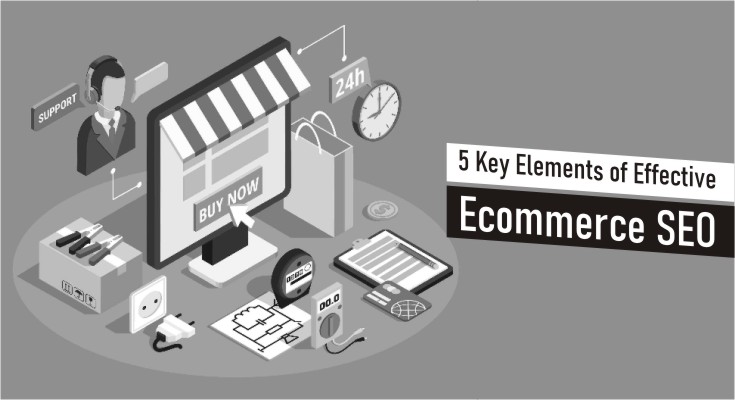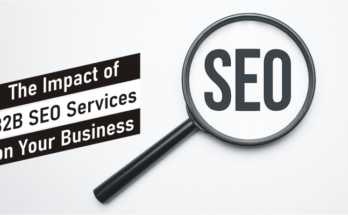In today’s highly competitive digital marketplace, having a well-optimized ecommerce website is critical for driving traffic, converting visitors into customers, and staying ahead of competitors. Search Engine Optimization (SEO) plays a key role in ensuring that your ecommerce website ranks well in search engine results, which can significantly impact visibility and sales. In this post, we’ll explore five key elements of effective ecommerce SEO that can help you achieve lasting success.
1. Keyword Research: Laying the Foundation
Keyword research is the cornerstone of any SEO strategy, and it’s particularly important for ecommerce sites. It involves identifying the words and phrases that potential customers are using when searching for products or services that you offer. By targeting the right keywords, you increase your chances of appearing in relevant search results, which can drive organic traffic to your site.
Effective keyword research for ecommerce goes beyond simply targeting generic, high-volume keywords. Long-tail keywords, which are more specific phrases with lower search volume, often yield better conversion rates because they reflect more precise search intent. For example, instead of targeting “women’s shoes,” which is highly competitive, you could target “black leather women’s ankle boots size 8.” This type of keyword is more likely to attract users who are ready to make a purchase.
In addition, ecommerce sites should focus on transactional keywords—those that indicate a user is ready to buy, such as “buy,” “order,” “cheap,” and “discount.” These keywords help capture users who are further along in the buying process. Tools like Google Keyword Planner, Ahrefs, and SEMrush can be invaluable for finding the right keywords for your ecommerce business.
2. Optimizing Product Pages: Make Them Search-Friendly
Your product pages are the heart of your ecommerce site, and optimizing them for SEO is crucial. Each product page should be treated as a unique opportunity to rank for relevant keywords and capture search traffic. Here are some ways to optimize your product pages:
- Title Tags and Meta Descriptions: Ensure that each product page has a unique and descriptive title tag and meta description that includes your primary keywords. These elements tell both users and search engines what your page is about, and they play a key role in click-through rates from search engine results pages (SERPs).
- Product Descriptions: Write unique, detailed product descriptions that highlight the key features and benefits of the product. Avoid using manufacturer-supplied descriptions, as these are often duplicated across multiple sites, which can harm your SEO efforts. Including relevant keywords naturally in your product descriptions can improve your page’s visibility in search results.
- Alt Text for Images: Search engines can’t “see” images, but they can read the alt text associated with them. Make sure that all images on your product pages include descriptive alt text that incorporates relevant keywords where appropriate.
- Internal Linking: Incorporating internal links to other relevant products or categories can help search engines understand the structure of your site and improve user experience by guiding visitors to additional products they might be interested in.
3. Technical SEO: Ensuring a Smooth User Experience
Technical SEO refers to the behind-the-scenes elements of your ecommerce site that affect its performance and how search engines crawl and index your pages. A well-optimized site not only ranks better but also provides a better user experience, which can lead to higher conversions. Here are a few technical SEO considerations for ecommerce:
- Site Speed: A fast-loading site is essential for both SEO and user experience. Google considers page speed as a ranking factor, and a slow site can lead to higher bounce rates. Compressing images, leveraging browser caching, and minimizing CSS, JavaScript, and HTML can improve load times.
- Mobile Optimization: With mobile commerce on the rise, having a mobile-friendly site is crucial. Google uses mobile-first indexing, meaning that it predominantly uses the mobile version of a site for ranking and indexing. Ensure your ecommerce site is responsive and offers a seamless experience on mobile devices.
- Structured Data: Implementing structured data (schema markup) can help search engines better understand the content on your site. For ecommerce sites, using product schema can enable rich snippets to appear in search results, showing product prices, availability, and reviews directly in SERPs, which can increase click-through rates.
- HTTPS: Security is a priority for Google, and sites that use HTTPS (rather than HTTP) tend to rank higher. An SSL certificate is crucial for ecommerce sites, not only for SEO but also for building trust with customers.
4. Content Marketing: Driving Organic Traffic
Content marketing is a powerful tool in ecommerce SEO. By creating valuable, informative content around your products and industry, you can attract a wider audience, improve your site’s SEO, and position yourself as an authority in your niche.
Start by creating a blog or resource center where you can publish articles, guides, and tips related to your products. For example, if you sell fitness equipment, you might create content around workout routines, equipment maintenance tips, or health benefits. This type of content allows you to target informational keywords that your audience is searching for, which can drive more traffic to your site.
In addition to blog content, consider producing product-related videos, how-to guides, and customer testimonials. Visual and multimedia content can not only engage users but also rank well in search engine results.
5. Building Quality Backlinks: Enhancing Domain Authority
Backlinks, or inbound links from other websites, are one of the most important ranking factors in SEO. They signal to search engines that your site is reputable and that your content is valuable. However, not all backlinks are created equal; quality matters more than quantity. Links from authoritative, relevant sites in your niche will have a much greater impact on your SEO than a large number of low-quality links.
For ecommerce, link-building strategies might include:
- Outreach to bloggers or influencers: Reach out to industry bloggers or influencers to review your products or mention your site in their content.
- Guest Posting: Writing guest posts for reputable blogs in your industry can help you earn backlinks and drive referral traffic.
- Partnerships and Sponsorships: Partnering with other businesses or sponsoring events in your niche can lead to high-quality backlinks from trusted sources.
Conclusion
Effective ecommerce SEO requires a holistic approach that incorporates keyword research, on-page optimization, technical SEO, content marketing, and backlink building. By focusing on these five key elements, you can improve your search engine rankings, attract more targeted traffic, and ultimately increase sales for your ecommerce business. SEO is a long-term investment, but with consistent effort, the benefits are significant and enduring.


